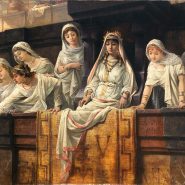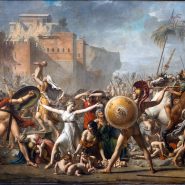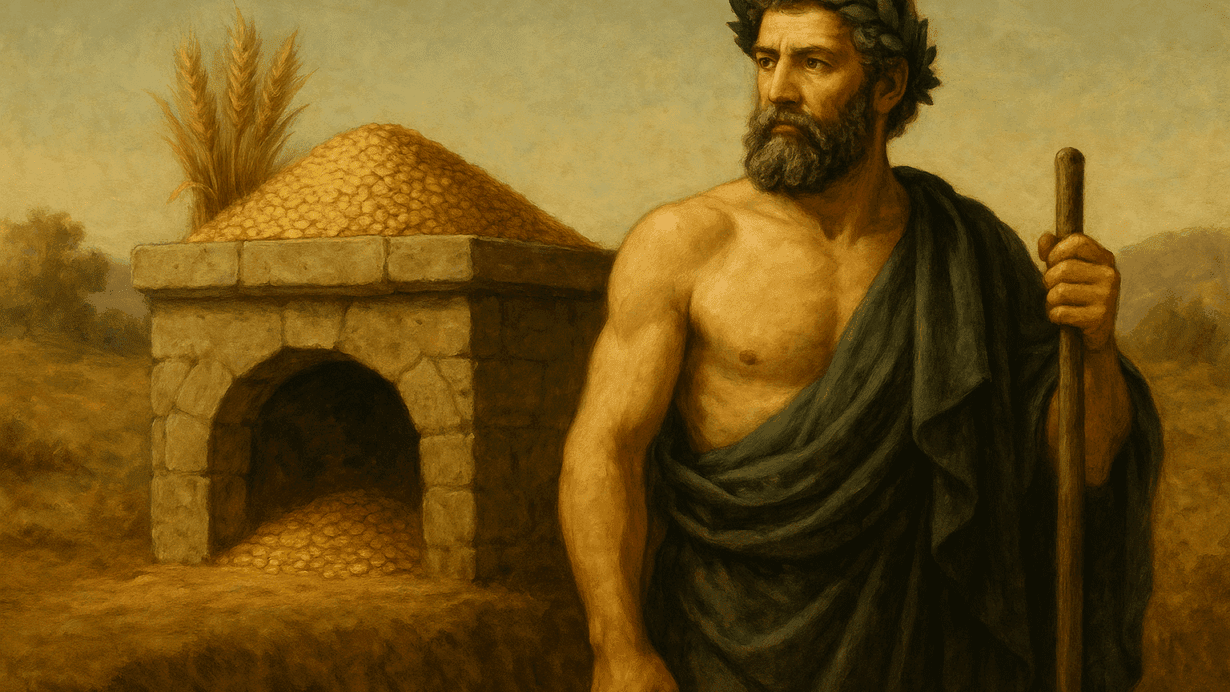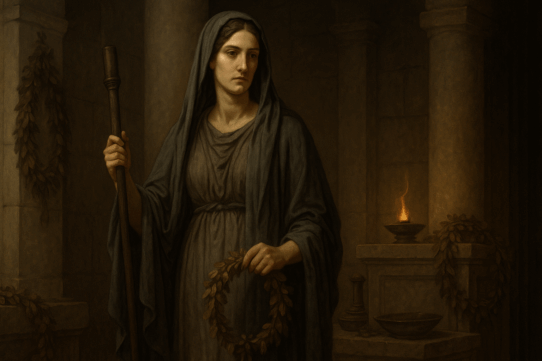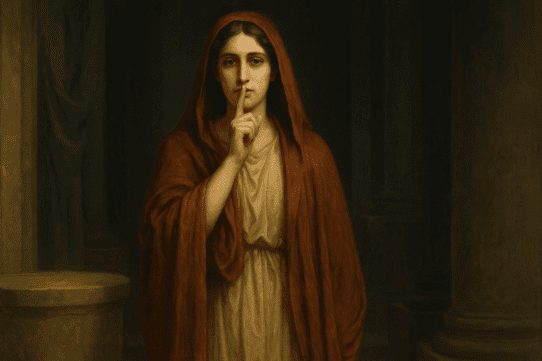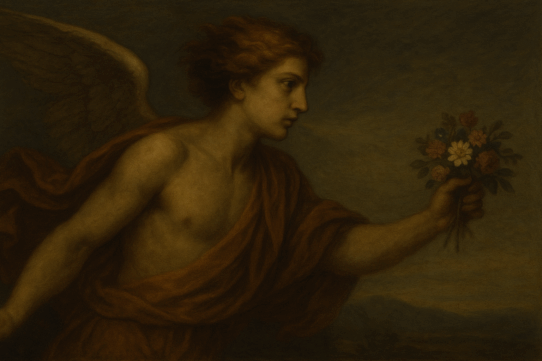QUICK SUMMARY
Consus is the Roman god of stored grain, hidden reserves, and secret councils. Honored in underground shrines, he protects a city’s food supply and presides over quiet strategic decisions. His festivals celebrate both abundance and the wisdom of planning ahead.
Consus is one of the most intriguing deities of ancient Rome, occupying a space where the practical and the mysterious overlap. As the god of stored grain, he was essential to Rome’s survival, safeguarding the harvest that sustained families, armies, and the city itself. Yet he was equally associated with secrecy, hidden deliberations, and quiet strategic planning. His name was invoked in practical rituals for abundance, but his festivals hinted at deeper layers of meaning, blending agriculture, politics, and mythic symbolism.
Consus stands as a reminder that ancient Rome valued not only hard work and cultivation but also the careful safeguarding of resources and the power of discreet counsel. In a society defined by both agriculture and empire, he embodied the ancient truth that prosperity depended as much on what was saved as on what was grown.
Origins and Early Identity
Consus was originally an agricultural deity of the early Romans and Latins, connected specifically to the protection of grain once it had been harvested and stored underground. His name may be linked to the Latin word condere, meaning to store or to hide. This association hints not only at the practical act of grain storage but also at the secrecy and concealment that became part of his divine identity.
Because ancient communities relied heavily on seasonal rhythms, a secure grain supply could mean the difference between abundance and famine. Consus personified the invisible labor that preserved a community’s prosperity, giving Rome a god who watched over what was buried from sight yet crucially important.
God of Granaries and Underground Storage
Unlike deities who governed the growth of crops, Consus presided specifically over grain that had already been harvested and set aside. This may include grain stored in pits, granaries, or underground silos used in early Italy. His worship acknowledged that the harvest did not guarantee survival. Only protected and preserved grain ensured Rome’s future.
In this sense, Consus was a guardian of foresight. The Romans understood that careful preparation sustained families during lean months. His presence reinforced a cultural value: true prosperity lies not in what is immediately consumed but in what is preserved for the long term.
His shrines were closely connected to the earth, mirroring the storage practices that placed grain below ground. This connection helped shape his unusual rituals and gave rise to his reputation as a hidden god whose presence was felt more than seen.
The Hidden Altar of Consus
One of the most fascinating aspects of Consus is his subterranean altar. Located at the Circus Maximus, the altar was buried beneath the ground and uncovered only during his festivals. For the rest of the year, it remained hidden from view, much like the grain he protected.
This altar was not an accident of construction. Its design symbolized Consus’s nature as a god of what is concealed. Ancient writers noted this feature with curiosity, linking it to the idea that Consus presided over secrets, counsel, and the preservation of knowledge not meant for open display.
When the altar was unearthed, it marked a moment of ritual revelation. The people of Rome honored both the material security of stored grain and the symbolic unveiling of wisdom that had been kept hidden until the proper time.
Consus and Secret Councils
Beyond his agricultural role, Consus evolved into a god associated with secret deliberations and strategic planning. Romans believed that he governed the kind of advice given in private, where leaders planned military campaigns, negotiated alliances, or reached decisions requiring discretion.
This dual identity makes him unique among Roman deities. He is at once practical and symbolic, agricultural and political. His festivals often included moments where people sought his blessing for decisions that required patience or secrecy, reinforcing the idea that wise counsel was as valuable as stored grain.
In this way, Consus represents a crucial Roman ideal: thoughtful strategy protects a community just as effectively as a well-stocked granary.
The Consualia Festivals
Consus was honored with two major festivals, the Consualia, celebrated in August and December. Both were held near the end of seasonal labor cycles, moments when Romans evaluated the year’s agricultural production and prepared for the next stage.
During these celebrations, Consus’s altar was ceremonially uncovered, and offerings of grain and wine were made. But the most striking aspect of the festivals involved horses, mules, and donkeys. These animals, essential in farming and transport, were crowned with garlands and rested from labor. Chariot races were held, adding a festive element to rituals that acknowledged both work and reward.
The involvement of animals reflects Consus’s tie to human labor and the interdependence of people and beasts in ancient agricultural life. Their temporary freedom from work symbolized the cycle of rest and preparation.
Consus and the Abduction of the Sabine Women
Consus also appears in one of Rome’s most famous foundational stories: the abduction of the Sabine women. According to legend, the event took place during the Consualia festival, when many of the surrounding tribes gathered in Rome to participate in the celebration.
During the festivities, the Romans seized the Sabine women to become their wives. Ancient writers connected this episode to Consus’s role as a god of secret councils, interpreting the abduction as a strategic plan executed under his divine watch.
The story created long-lasting symbolic ties:
- Consus presides over hidden intentions
- Strategic planning can shape the destiny of a people
- Festivals sometimes carry deeper cultural messages
Whether or not the historical event occurred, the association strengthened Consus’s image as a deity linked to clever strategy and concealed action.
Symbolism and Meaning
Consus’s dual nature as a god of grain and of counsel reflects a deeper truth about Roman culture.
Protection and Preservation
Stored grain represents stability. Consus symbolizes the wisdom of preparing for the future and safeguarding resources.
Secrecy and Strategy
Silent deliberation and careful planning were valued in Roman politics and warfare. Consus presided over these hidden processes, reinforcing their importance.
Cycles of Rest and Renewal
His festivals reminded the community that after labor came celebration, reflection, and preparation for what lay ahead.
Connection to the Earth
His buried altar symbolized humility before the natural world, acknowledging that true security comes from both nature and human effort.
Legacy and Modern Interpretation
Today, Consus stands as a figure easy to understand in a world where resource management and strategic planning remain central to human survival. His presence invites reflection on how communities protect their assets, how leaders form decisions, and how long-term thinking shapes the future.
Consus is relevant not because he appears in epic tales but because he represents a universal truth: prosperity requires both careful storage and careful thought.
Conclusion
Consus may not be the most famous god of Rome, but his influence reaches into the foundations of Roman life. As the protector of stored grain, he ensured that abundance lasted beyond the harvest. As the patron of hidden counsel, he guided the quiet moments when plans were formed and futures determined.
Through Consus, we see a Rome that valued foresight, preparation, and the power of what lies beneath the surface. His legacy continues to resonate wherever people understand that survival depends on both what is saved and what is wisely planned.
